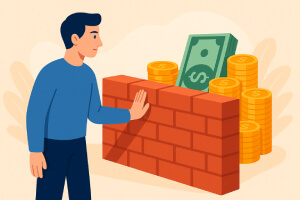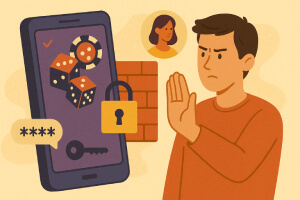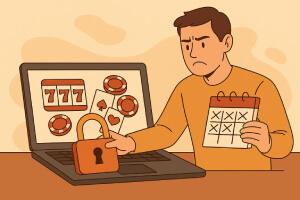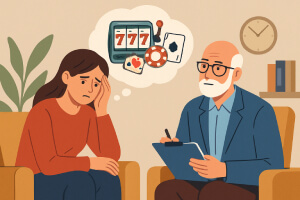The First Signs Are Subtle, but Noticeable
This isn't us trying ot get you to quit, it is just a guide on how to protect yourself.
The shift from entertainment to compulsion happens pretty much in the blink of an eye, especially now, with online platforms in our pockets.
The casino never closes, and the bookie is always available.
The initial red flags don't wave, they whisper.
It starts slowly. You're in a work meeting, but your mind is replaying last night's bad beat or planning your next wager. You're at dinner with your family, but you're mentally calculating odds. The constant thoughts are the first sign the hobby is becoming a habit.

Money Starts Moving in a Different Rate
The bank statement cannot lie. Take a real look at it. Are you depositing money into your bank more often? Have the sums started going up? I've seen people go from a casual $20 on a Saturday to $200 a day in just a few months. The change feels so gradual when you're in it, but looking back, the ramp-up is terrifyingly fast.
A major line is crossed when essential funds become negociable. When the rent payment or the grocery budget starts looking like your ticket to a big win, you're in a pretty bad place.

Behavioral Changes
First, you lie to others. "I just had a bad week" becomes your motto. Soon, you're inventing stories about unexpected car repairs or work expenses to explain where the money went. It's not just about money; you start lying about time. A quick ten-minute session turns into three hours, but you'd never admit it.
Then, the physical sings start showing up. Your sleep schedule is a wreck because you're up until 3 AM chasing a streak on a foreign league you know nothing about. Your focus and productivity at work starts to suffer. The people you care about feel the distance because even when you're with them, your head is somewhere else - fixed on the win that will make everything right again.

The Psychological Signs Start to Appear
When the quality of your mood is directly linked to your gaming sessions, you're likely to start developing a bit of a problem.
The wild euphoria from a win is followed by a crushing pit of sadness after a loss. Living on that emotional roller coaster is exhausting and you will see the tells quite quickly. Another sign- Getting angry or irritable when you can't place a bet. If a slow app or a forgotten password triggers genuine rage, it's a sign that a dependency has taken hold.
Why Chasing Losses Is a Guaranteed Disaster
If there is one behavior that fast-tracks a manageable problem into a full-blown catastrophe, it's chasing losses. I watched people lose homes, families, and careers because they simply could not walk away from a casino table or game and accept a loss.
The Math Has No Mercy
You have to understand this core truth: every bet is an independent event.
The fact that you lost the last ten bets has zero impact on your chance of winning the next one. The house edge doesn't care about your losing streak; it's a constant, mathematical reality working against you.
The math on chasing losses is brutal, but the psychology is what truly destroys people.
Desperation Is a Judgment Killer
What we've seen happen is that the part of the brain that does the thinking just shuts down at one point. It's no longer about strategy or even fun: it's a raw, panicked scramble to undo the damage.
All your expertise in a particular sport or game is gone. You find yourself betting on things you don't understand -Lithuanian basketball at 3 AM, volatile slots with flashinglights -because the action is fast and the promise of a quick recovery is intoxicating.
This is the danger zone. It's where you start making bets that are completely out of proportion to your finances, where one more loss isn't just a setback, but a financial torpedo.
Your Action Plan: How to Fight Back
Getting back in the driver's seat isn't a passive wish. It's an active fight, and you have to be ready to make some hard choices and stick to them. These are the moves that work.

Build a Firewall for Your Finances
This has to be step one. Go through every gambling site you use and slash your deposit limits. Don't kid yourself about what you “can handle.” Aim low-rock bottom. Think $25 a day or less. The point isn't to manage your play, it's to keep you from blowing everything in one bad run. While you're at it, switch on every cool-down and time-out option available. That 24-hour delay before you can raise limits might feel like a hassle, but honestly, it's one of the best safety nets you'll ever set up.

Make Gambling Inconvenient
Your next move is to make it as annoying as possible to place a bet. Delete the apps. Log out of every site. Better yet, use a password manager to create some impossible string of nonsense you won't remember. Every extra step is a speed bump that gives your rational brain time to kick in. And yes, this is the part everyone hates-get someone else involved. A partner, sibling, close friend. Show them your bank statements. Having somebody who can call you out kills the secrecy, and secrecy is what makes this habit thrive.

Starve the Habit
You've got to prove to yourself that you can function without gambling. Use the self-exclusion tools. Don't panic about a lifetime ban-start small. Lock yourself out for a week and see how it feels. Then push for a month. That space is valuable because it forces you to face whatever gambling was covering up.
Were you bored? Stressed? Just looking for an escape? Once you figure that out, you can start filling that gap with something healthier-something that doesn't drain you.

Get a Professional in Your Corner
Trying to tackle this solo is like playing a video game on nightmare mode. There's no prize for doing it the hard way. Getting professional help is about giving yourself a coach who actually knows how this game is played. If you're in Wyoming, the Wyoming Council on Problem Gambling is a great place to start.
They've got people who understand exactly what you're up against, and the support is confidential. Making that call isn't weakness-it's strategy.
Treatment isn't some mysterious process. A lot of the time it's straightforward stuff like cognitive-behavioural therapy (CBT), which helps you unlearn the thought loops that trigger the urge to gamble. Support groups are another lifeline-rooms full of people who get it, because they've been there too.
Don't expect the road back to be straight or easy. Some days will feel solid, others you'll feel that tug pulling you back. That's normal. What matters is having a system of people and tools to lean on in those rough patches, and keeping your eyes on what you're rebuilding-your money, your relationships, your peace of mind. Every step forward, even the small ones, counts as a win.
Trying to stop gambling but can’t? That loss of control is a warning sign, and help is here.
— 800-GAMBLER (@ccgofnj) September 8, 2025
📱 Call or text 800-GAMBLER for confidential support.#KnowTheSigns #ProblemGambling #RecoveryIsPossible pic.twitter.com/eWi0pRkkaZ
You are not stuck. You are fighting. You are healing.
— ConnexOntario (@ConnexOntario) August 25, 2025
Connect to live, free, and confidential mental health, addiction, and problem gambling community support and services.#connexontario #MentalHealthMatters #emotions #WellnessJourney #Ontario pic.twitter.com/eKDZ3wU2t4
Women often turn to gambling as an escape from life's challenges, but it can lead to a cycle of depression and isolation. 🧠
— Algamus Gambling Treatment (@algamus_az) September 4, 2025
Up to 76% of individuals in gambling addiction treatment also experience depression. https://t.co/LVnz9FfGUs
#GamblingAddiction #WomenInRecovery pic.twitter.com/PLFeu5nKA8